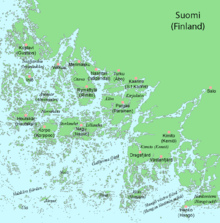| Revision as of 23:35, 21 May 2008 edit24.3.107.7 (talk) →See also← Previous edit | Revision as of 23:38, 21 May 2008 edit undo24.3.107.7 (talk) →The Ellis ReportNext edit → | ||
| Line 11: | Line 11: | ||
| == The Ellis Report == | |||
| ==See also== | ==See also== | ||
| {{Wiktionary}} | {{Wiktionary}} | ||
Revision as of 23:38, 21 May 2008

An archipelago (Template:PronEng) (ark-ə-PĔLL-ə-gō) is a chain or cluster of islands. The word archipelago literally means "chief sea", from Greek arkhon (arkhi-) ("leader") and pelagos ("sea"). In antiquity, the Archipelago (Greek: Αρχιπέλαγος) was the proper name for the Aegean Sea and, later, usage shifted to refer to the Aegean Islands (since the sea is remarkable for its large number of islands). It is now used to generally refer to any island group or, sometimes, to a sea containing a large number of scattered islands like the Aegean Sea.
Types of Archipelagos
Archipelagos are usually found in the open sea; less commonly, a large land mass may neighbor them, an example being Scotland which has more than 700 islands surrounding the mainland. Archipelagoes are often volcanic, forming along mid-ocean ridges or hotspots, but there are many other processes involved in their construction, including erosion, deposition, and land elevation.
The four largest modern states that are mainly archipelagos are Japan, the Philippines, the United Kingdom and Indonesia (the world's largest archipelagic state according to the CIA World Factbook) .
The largest archipelago in the world by size is in Northern Canada, the Canadian Arctic Archipelago, situated in the Arctic Ocean.
See also
- Island arc
- Geography
- Earth science
- Geomorphology
- List of landforms
- Plate tectonics
- Island nation
- Earthsea
- The World
- Lists of islands: see List of archipelagos and List of islands

This article about geography terminology is a stub. You can help Misplaced Pages by expanding it. |